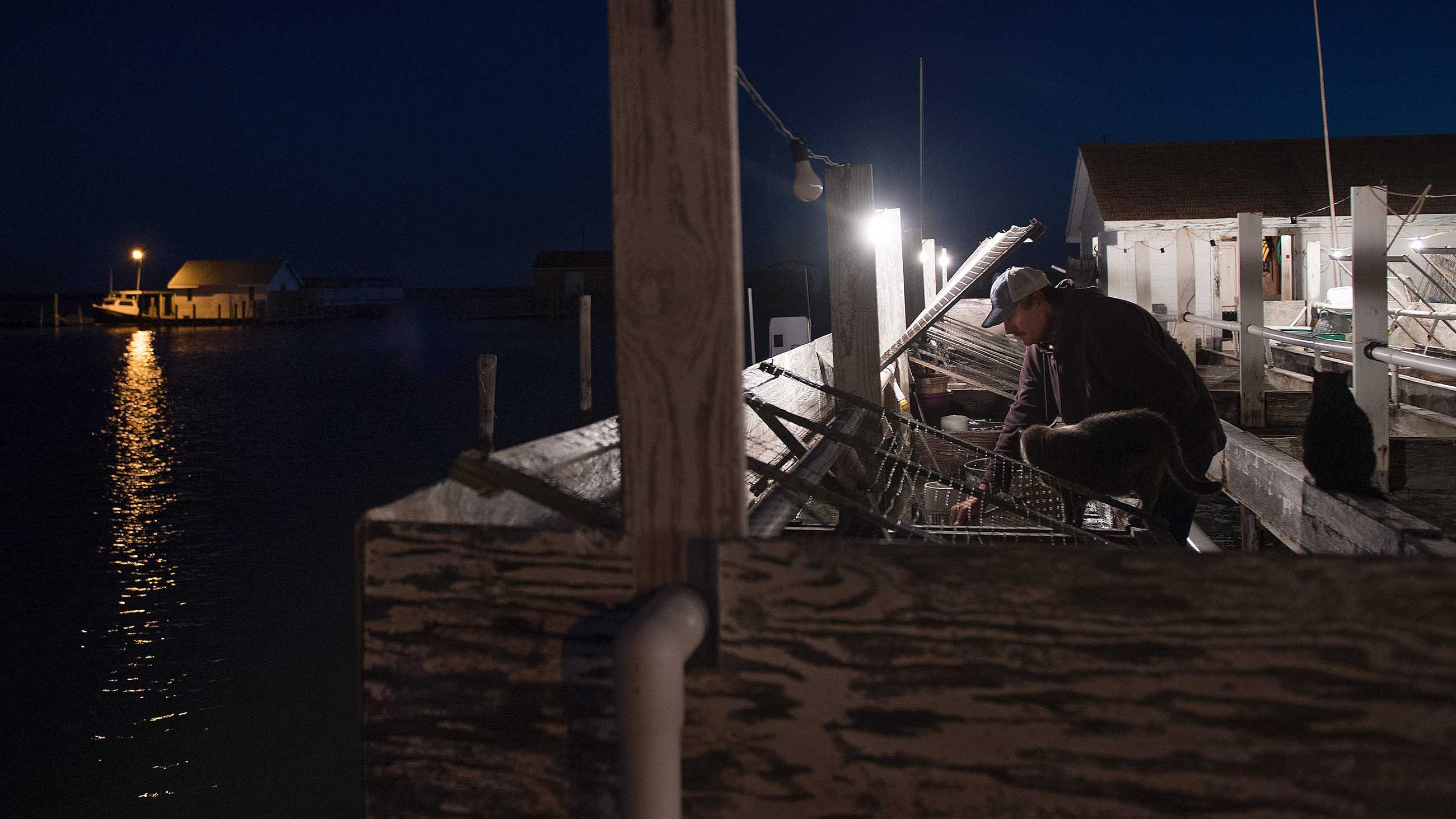“The good thing about science,” Neil deGrasse Tyson tells us, “is that it’s true whether or not you believe in it.” Your stance on gravity is irrelevant. Either way, if you step off a cliff, you will most certainly fall. Likewise your stance on climate change. If you live on an island in the middle of 18 trillion gallons of warming, expanding water, you’re eventually going to sink no matter what you believe.

BOOK REVIEW — “Chesapeake Requiem: A Year With the Watermen of Vanishing Tangier Island,” by Earl Swift (Dey Street Books, 448 pages).
Tiny, waterlogged Tangier Island, off the coast of Virginia in Chesapeake Bay, is full of people of faith. They believe in God. Climate science, not so much. In recent years, they’ve garnered some media attention for the paradox of largely rejecting sea-level rise while simultaneously suffering its wrath. Earl Swift, an author of six previous books and a former correspondent for The Virginian-Pilot, immersed himself for the better part of two years with the 481 inhabitants of Tangier. His new book, “Chesapeake Requiem: A Year with the Watermen of Vanishing Tangier Island,” is part regional history, part crabber ride-along, part disaster narrative in slow motion.
At its best, “Chesapeake Requiem” is a meditation on belief and disbelief in an America shouting about fake news. Swift is unflinching about the catastrophe on the ground, but careful not to belittle the beliefs of those at the heart of the calamity. He works hard to move beyond fly-by descriptors like “quaint” or “lost in time,” which mainlanders often use to describe the isolated crabbing community. Instead he penetrates a human community facing an existential threat in ways few of us can understand. They may not believe in a major factor of their own demise, but that doesn’t render their extinction any less real.
“We’ve actually got people sitting around debating whether these people are worth saving. How is that OK?” one islander tells Swift. “I don’t care if you want to call it erosion or sea-level rise or Aunt Sadie’s butt-boil. It doesn’t matter what’s causing it. The point is that this disaster is happening, and these people need help.”
Tangier’s situation is indeed dire. As if sea-level rise weren’t enough, the island has also long lost ground to erosion, and the entire region is sinking. Some 21,000 years ago, the Laurentide ice sheet stretched across the middle of the continent, its tremendous weight pushing down the earth below, while the ground around it curled upward. Now that the ice is gone, the land that seesawed up — including coastal Virginia — is seesawing back down. Scientists call it “glacial isostatic adjustment,” but to put it bluntly, the ground is falling while the water is rising.
Tangier, which Swift describes looking like “a board-flat green wafer just above the water,” will be uninhabitable by 2063, according to a 2015 study in Scientific Reports. The study’s lead author admits to Swift that the estimate was conservative. These days he puts the number of Tangier’s remaining years “probably closer to 25.”
“[I]f no action is taken, the citizens of Tangier may become among the first climate change refugees in the continental USA,” the 2015 report concluded.
This is not for a lack of proposals to save Tangier or at least delay its demise. The book charts decades of plans for jetties and seawalls — all scuttled by a lack of funding, calls for yet more studies, congressional distraction, or all of the above. Meanwhile, Congress has approved $1.4 billion to rebuild wetlands for nesting birds on a sinking island just 60 miles north of Tangier. The human population of that island is zero. Is it any wonder that these people are cynical about their own government?
Swift spends much of the book emptying crab pots with James Wyatt Eskridge, known simply as Ooker. Like many on the island, Ooker was born there, and his family has called it home since George Washington led the Continental Army in the Battle of Monmouth. In addition to his 50-plus years crabbing, Ooker has been Tangier’s mayor for the past eight. That makes him the go-to face of the island whenever CNN, The New Yorker, the BBC or any number of news outlets decide to mine the island for click-worthy quirks and contradictions.
Swift recounts a time Ooker appeared in a CNN town hall on climate change featuring the climate activist Al Gore. In a memorable exchange, Ooker asks Gore why — if the seas are indeed rising — he hasn’t he seen it in all his decades of working the Chesapeake Bay. “Our island is disappearing, but it’s because of erosion and not sea-level rise,” he tells the former vice president.
Rather than explain the individual imperceptibility of sea-level variations across decades, Gore instead answers with a parable. A man trapped in a flood rejects the help of passersby, insisting instead that “the Lord will provide.” When the man eventually dies and ascends to Heaven, he asks God why he didn’t provide, to which God insists that he did — in the form of the passersby offering their help.
It’s a powerful illustration of science and religion talking past one another — each side missing the other side’s relevance and meaning. The islanders felt that Ooker “won” the argument and that Gore had mocked their faith. (On Ooker’s crabbing shanty hangs an Ichthys — Jesus fish — and the words “WE BELIEVE.”) Swift offers readers a more nuanced take on the back and forth:
“The Lord has provided the islanders with minds for recognizing the danger that faces them. That might be the sum of what the Lord plans to provide them with, this time around. Denying that the danger exists — or expecting a miracle to chase it away — might not be what the Lord has in mind.”

There’s a difference between being saved and being saved, but the two aren’t mutually exclusive. Swift’s insight into the Ooker-Gore exchange is built on years of listening to both the science and the Sunday sermons at Tangier’s Swain Memorial. Swift, himself admittedly “no follower of organized religion,” employs his own imaginative faculties to behold the wicked problem of climate change in a way that Ooker might actually respect. (At least I hope so; it’s unclear if the writer shared his analysis of Gore’s parable with the crabber.) The coming decades will demand boatloads of that kind of empathy as more and more places like Tangier lose their battles to the sea.
At times, “Chesapeake Requiem” strays too far into tangents that distract from its important points. Swift isn’t the only writer to depict Tangier as a bellwether for how we handle climate refugees, and more hurried readers can get the gist elsewhere. Nevertheless, the book is a rich contribution to the growing genre of climate-science narrative nonfiction. Not just because Swift documents a culturally significant piece of America that will likely soon disappear, but also because he is trying to make sense of climate-change doubt in those with the greatest incentive to believe.
“We are here until he [God] says otherwise,” one islander tells Swift. At this point, even the science seems to agree that only a miracle could save Tangier.
David J. Unger is a Chicago-based writer and reporter who has written for Undark, InsideClimate News, The Atlantic, and other publications. He was the energy editor at The Christian Science Monitor.











Comments are automatically closed one year after article publication. Archived comments are below.
That such an idyllic place is slipping into the sea is certainly newsworthy. But so is the community’s quirky reluctance to acknowledge the role of human-caused climate change. Instead, residents blame mere erosion. They also boast that Tangier voted 87 percent for President Trump – who doubts man-made climate change and who recently promised Tangier will be around for “hundreds more” years.
Unfortunately, that’s not what the science says. Instead, it is clear that local geography interacts with rising seas to create erosion rates likely to leave Tangier uninhabitable within a few decades. And that’s only if the increasingly powerful storms now sweeping the Atlantic Ocean don’t eliminate the town sooner.
Maybe God’s children need to grow up a bit. Why would their deity want perpetual infants?
These people, being Americans, are free to believe whatever they wish as the cause of their disappearing island. But if they don’t vacate, they will perish, and I will have no sympathy whatsoever. It doesn’t make a person less godly to duck when someone is shooting at them, or to find a new place to live when climate science is lapping their shoes.
If they want to drown believing it’s God’s Will, by all means, let them.
If they are sure their island is sinking, and sea level is not rising, all they would need is simple survey equipment to prove their hypothesis. There may even be historical surveys from as far back as good ole’ Washington to use as a reference. I think they are both right and wrong. Their island is sinking and eroding, but due to climate change and they are going to lose the battle, period. Now if they were wealthy they’d have the money to lobby congress and have tons of rock and earth and sand trucked in and their homes raised and their way of life saved for another generation or two, without money you have a small voice, an inaudible whisper. as ruled by the Supreme court, “Citizens United”!
I think it’s painfully obvious that Tangier Island will either be sacrificed on the cold, dispassionate table of a some detached accountant’s cost-benefit analysis or die a withering death by governmental inaction. Either way what’s long been apparent to this reader is that climate change triage is here to stay.
Welcome to the Anthropocene.
Strange that the view which belittles the faith of the Tangier Island residents makes no explanation for why it the $1.4 billion should be spent on Tangier instead of the uninhabited island to the north. Seems that Tangier is just survival of the fittest. Or maybe that isn’t such a great theory.
Author may not be a naturalistic evolutionist. But for those who are, there is no logical basis for preferring to help Tangier’s residents.
Let their imaginary friend in the sky help them.